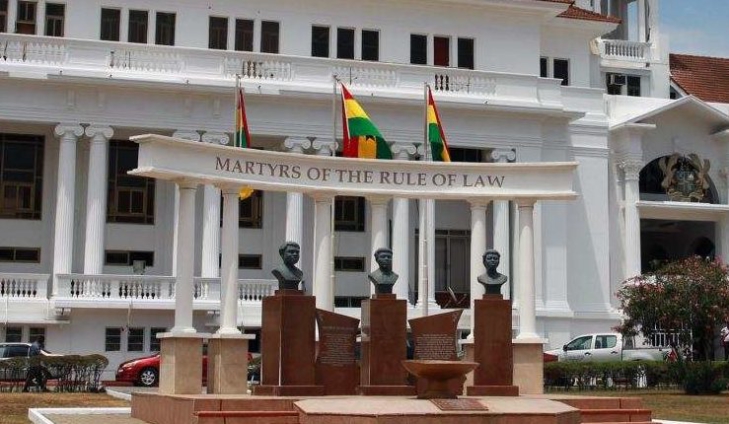The Supreme Court has, in a unanimous decision, ruled that the traditional areas of Santrofi, Akpafu, Likpe and Lolobi cannot fall within the Hohoe Constituency.
The Apex court explains that this is because the said traditional areas following the creation of new regions ended up falling within the Oti Region.
Hohoe Constituency on the other hand falls within the current Volta Region amidst the constitutional requirement that a constituency shall not fall within more than one region.
This is the Judgement in the case of Valentine Edem Dzatse vrs Henry Ametefe, NDC Parliamentary Candidate for Hohoe Prof Margaret Kweku and four others.
The case was heard by Justices Paul Baffoe-Bonnie, Gabriel Pwamang, Samuel Marful Sau, Nene Amegatcher, Ashie Kotey, Mariama Owusu and Lovelace Johnson.
The case commenced at the Ho High Court but was referred to the Supreme Court for interpretation. The court had been asked to hold that Constitutional Instrument 95 (C.I 95) which determines the areas of a constituency is inconsistent with article 47 (2) of the 1992 constitution which stipulates that no constituency shall fall within two regions.
The plaintiff in the case, Valentine Edem Dzatse had contended that Constitutional Instrument 112 (C.I 112) which set up the Oti Region provides that the traditional areas of Santrofi, Akpafu, Likpe and Lolobi fall within the Oti Region. This is despite the fact that these areas per C.I 95 are part of the Hohoe Constituency. This, therefore, creates a situation the constitution sought to avoid by not having an area in two regions.
The Electoral Commission which had its Municipal Electoral Officer named as a defendant in the case agreed with the case of the plaintiff adding that C.95 ought to be amended to reflect the current split of the regions.
The other defendants, however, disagreed saying the President in creating the regions should have noted that he was limited by Article 47 (2) to ensure that the said traditional areas remain within the Hohoe Constituency.
The Apex Court took the view that there is no such limitation placed on the President in creating regions but rather the law showing the areas covering constituencies ought to be amended to reflect the current regional distribution. The court, therefore, concluded that C.95 is inconsistent with article 47 (2) of the constitution.
The court however restrained itself from declaring the law as void explaining that any review of constituencies per article 47(6) takes effect upon the dissolution of parliament.
The Court finally ordered the Electoral Commission to amend CI 95 to ensure that the said traditional areas do not fall within two regions.
Latest Stories
-
Gold Fields Ghana Foundation challenges graduates to maximise benefits of community apprenticeship programme
1 hour -
GBC accuses Deputy Information Minister Sylvester Tetteh of demolishing its bungalow illegally
2 hours -
Boost for education as government commissions 80 projects
2 hours -
NAPO commissions library to honour Atta-Mills’ memory
2 hours -
OmniBSIC Bank champions health and wellness with thriving community walk
2 hours -
Kora Wearables unveils Neo: The Ultimate Smartwatch for Ghana’s tech-savvy and health-conscious users
2 hours -
NDC supports Dampare’s ‘no guns at polling stations’ directive
2 hours -
Police officer interdicted after video of assault goes viral
2 hours -
KNUST’s Prof. Reginald Annan named first African recipient of World Cancer Research Fund
2 hours -
George Twum-Barimah-Adu pledges inclusive cabinet with Minority and Majority leaders
3 hours -
Labourer jailed 5 years for inflicting cutlass wounds on businessman
3 hours -
Parliament urged to fast-track passage of Road Traffic Amendment Bill
3 hours -
Mr Daniel Kofi Asante aka Electrician
3 hours -
Minerals Commission, Solidaridad unveils forum to tackle child labour in mining sector
3 hours -
Election 2024: Engagement with security services productive – NDC
3 hours

